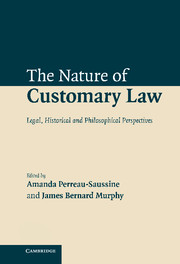Book contents
- Frontmatter
- Contents
- List of contributors
- Table of cases
- The character of customary law: an introduction
- Part I Custom and morality: natural law, customary law and ius gentium
- 1 Pitfalls in the interpretation of customary law
- 2 The moral role of conventions
- 3 Habit and convention at the foundation of custom
- 4 Custom, ordinance and natural right in Gratian's Decretum
- 5 Vitoria and Suarez on ius gentium, natural law, and custom
- 6 Custom and positivity: an examination of the philosophic ground of the Hegel–Savigny controversy
- Part 2 Custom and law: custom, common law and customary international law
- Index of names
5 - Vitoria and Suarez on ius gentium, natural law, and custom
Published online by Cambridge University Press: 30 June 2009
- Frontmatter
- Contents
- List of contributors
- Table of cases
- The character of customary law: an introduction
- Part I Custom and morality: natural law, customary law and ius gentium
- 1 Pitfalls in the interpretation of customary law
- 2 The moral role of conventions
- 3 Habit and convention at the foundation of custom
- 4 Custom, ordinance and natural right in Gratian's Decretum
- 5 Vitoria and Suarez on ius gentium, natural law, and custom
- 6 Custom and positivity: an examination of the philosophic ground of the Hegel–Savigny controversy
- Part 2 Custom and law: custom, common law and customary international law
- Index of names
Summary
Although the worlds of Vitoria and Suarez were remote from our own, some of the problems these authors faced resemble ones that still concern modern jurists and political philosophers; and these problems involve not only the content of international law but also its grounding in custom or natural law or positive enactments. In this paper I want to suggest that Vitoria displayed considerable versatility in deploying various norms of international law – or even in inventing such norms on occasion – but without any serious concern for the grounding of these norms, whether in custom or in some other source. Suarez, on the other hand, coming two generations later, presented a detailed account of the sources of ius gentium within a massive synthesis that included full-scale treatments of natural law and customary law.
Past and present
Anthony Pagden has warned us against studying earlier ideas on international law with present-day concerns in mind:
[B]y re-describing the battles of the early modern world in modern terms, by making Francisco de Vitoria the remote ancestor of the Charter of the United Nations or the Bill of Rights, the specificity of the conflict is lost, and with it the possibility of its significance as a process over time.
Such statements are of course platitudinous among historians. It is precisely the specificity of a past situation that we need first to understand.
- Type
- Chapter
- Information
- The Nature of Customary LawLegal, Historical and Philosophical Perspectives, pp. 101 - 124Publisher: Cambridge University PressPrint publication year: 2007
- 26
- Cited by



